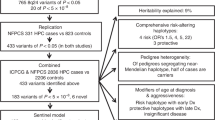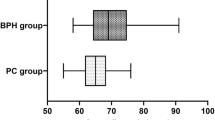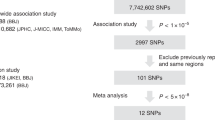Abstract
Background
Variants of 8q24 locus have been associated with prostate cancer (PCa) susceptibility. This study aims to analyze the genetic basis of PCa susceptibility in Mexican men by analyzing SNPs in the 8q24 locus for the first time.
Methods
A case-control study was performed in 875 men recruited from the Mexican Social Security Institute, 326 patients with PCa, and 549 non-PCa patients (88 with benign prostatic hyperplasia BPH and 461 healthy controls). The 8q24 locus SNPs: rs16901979, rs16983267, rs1447295, and rs7837328 were genotyped by allelic discrimination assays using TaqMan probes. Statistical analysis was performed using Epi Info statistical 7.0 and SNPstats softwares.
Results
All genotype frequencies were in Hardy-Weinberg Equilibrium. No differences were observed in genotype distribution between PCa and non-PCa patients for rs6983267. Under different inheritance models, the rs16901979, rs1447295, and rs7837328 SNPs were associated with PCa (OR = 2.8, 1.8, and 1.72, respectively; Pc < 0.001) when comparing PCa patients against controls. This association remains between PCa and BPH patients under different models (OR = 8.5, 2.2, and 1.9, respectively; Pc < 0.001). There were no significant differences in allele and genotype distribution among BPH patients and controls. The combined effect of the alleles CGAA for the SNPs rs16901979, rs6983267, rs1447295, and rs7837328 showed significant differences between PCa patients and controls (OR = 2.9, 95% CI = 1.48–5.83, Pc = 0.008). Four 8q24 variants were not associated with D’Amico score, age at diagnosis, and bone metastases.
Conclusions
Our study provides the first confirmation that variants rs16901979, rs1447295, and 7837328 at 8q24 locus are associated with PCa susceptibility in Mexican men.
This is a preview of subscription content, access via your institution
Access options
Subscribe to this journal
Receive 4 print issues and online access
$259.00 per year
only $64.75 per issue
Buy this article
- Purchase on Springer Link
- Instant access to full article PDF
Prices may be subject to local taxes which are calculated during checkout
Similar content being viewed by others
References
Fitzmaurice C, Abate D, Abbasi N, Abbastabar H, Abd-Allah F, Abdel-Rahman O, et al. Global, regional, and national cancer incidence, mortality, years of life lost, years lived with disability, and disability adjusted life-years for 29 cancer groups, 1990 to 2017: a systematic analysis for the global burden of disease study. JAMA Oncol. 2019;5:1749–68. https://doi.org/10.1001/jamaoncol.2019.2996
Pilleron S, Sarfati D, Janssen-Heijnen M, Vignat J, Ferlay J, Bray F, et al. Global cancer incidence in older adults, 2012 and 2035: a population-based study. Int J Cancer. 2019;144:49–58. https://doi.org/10.1002/ijc.31664
Bhardwaj A, Srivastava SK, Khan MA, Prajapati VK, Singh S, Carter JE, et al. Racial disparities in prostate cancer: a molecular perspective. Front Biosci. 2017;22:772–82. https://doi.org/10.2741/4515
Amundadottir LT, Sulem P, Gudmundsson J, Helgason A, Baker A, Agnarsson BA, et al. A common variant associated with prostate cancer in European and African population. Nat Genet. 2006;38:652–8. https://doi.org/10.1038/ng1808
Freedman ML, Haiman CA, Patterson N, McDonald GJ, Tandon A, Waliszewska A, et al. Admixture mapping identifies 8q24 as a prostate cancer risk locus in African-American men. Proc Natl Acad Sci USA. 2006;103:14068–7. https://doi.org/10.1073/pnas.0605832103
Yeager M, Orr N, Hayes RB, Jacobs KB, Kraft P, Wacholder S, et al. Genome-wide association study of prostate cancer identifies a second risk locus at 8q24. Nat Genet. 2007;39:645–9. https://doi.org/10.1038/ng2022.
Li Q, Liu X, Hua RX, Wang F, An H, Zhang W, et al. Association of three 8q24 polymorphisms with prostate cancer susceptibility: evidence from a meta-analysis with 50,854 subjects. Sci Rep. 2015;5:12069 https://doi.org/10.1038/srep12069
Ghoussaini M, Song H, Koessler T, Al Olama AA, Kote-Jarai Z, Driver KE, et al. Multiple loci with different cancer specificities within the 8q24 gene desert. J Natl Cancer Inst. 2008;100:962–6. https://doi.org/10.1093/jnci/djn190
Hutter CM, Slattery ML, Duggan DJ, Muehling J, Curtin K, Hsu L, et al. Characterization of the association between 8q24 and colon cancer: gene-environment exploration and meta-analysis. BMC Cancer. 2010;10:670–85. https://doi.org/10.1186/1471-2407-10-670
Jia L, Landan G, Pomerantz M, Jaschek R, Herman P, Reich D, et al. Functional enhancers at the gene-poor 8q24 cancer-linked locus. PLoS Genet. 2009;5:e1000597 https://doi.org/10.1371/journal.pgen.1000597
Lamb DJ, Tannour-Louet M. In vivo exploration of the functional activity of non-coding 8q24 prostate cancer risk locus. Asian J Androl. 2010;12:787–9. https://doi.org/10.1186/1471-2407-10-670
Al Olama AA, Kote-Jarai Z, Giles GG, Guy M, Morrison J, Severi G, et al. Multiple loci on 8q24 associated with prostate cancer susceptibility. Nat Genet. 2009;41:1058–60. https://doi.org/10.1038/ng.452
Grizancio C, Freedman ML. Chromosome 8q24-associated cancers and MYC. Genes Cancer. 2010;1:555–59. https://doi.org/10.1177/1947601910381380
Ahmadiyeh N, Pomerantz MM, Grisanzio C, Herman P, Jia L, Almendro V, et al. 8q24 prostate, breast, and colon cancer risk loci show tissue-specific long-range interaction with MYC. Proc Natl Acad Sci USA. 2010;107:9742–46. https://doi.org/10.1073/pnas.0910668107
Shi J, Zhang Y, Zheng W, Michhailidou K, Ghoussaini M, Bolla MK, et al. Fine-scale mapping of 8q24 locus identifies multiple independent risk variants for breast cancer. Int J Cancer. 2016;139:1303–17. https://doi.org/10.1002/ijc.30150
Sotelo J, Esposito D, Duhagon MA, Banfield K, Mehalko J, Liao H, et al. Long-range enhancers on 8q24 regulate c-Myc. Proc Natl Acad Sci USA. 2010;107:3001–05. https://doi.org/10.1073/pnas.0906067107
Wasserman NF, Aneas I, Nobrega MA. An 8q24 gene desert variant associated with prostate cancer risk confers differential in vivo activity to a MYC enhancer. Genome Res. 2010;20:1191–97. https://doi.org/10.1101/gr.105361.110
Meyer KB, Maia A-T, O’Reilly M, Ghoussaini M, Prathalingam R, Porter-Gill P, et al. A functional variant at a prostate cancer predisposition locus at 8q24 is associated with PVT1 expression. PLoS Genet. 2011;7:e1002165 https://doi.org/10.1371/journal.pgen.1002165
Du M, Yuan T, Schilter KF, Dittmar RL, Mackinnon A, Huang X, et al. Prostate cancer risk locus at 8q24 as a regulatory hub by physical interactions with multiple genomic loci across the genome. Hum Mol Genet. 2015;24:154–66. https://doi.org/10.1093/hmg/ddu426
Aggarwal A, Unger-Saldaña K, Lewison G, Sullivan R. The challenge of cancer in middle-income countries with an ageing population: Mexico as a case study. Ecancermedicalscience. 2015;9:536 https://doi.org/10.3332/ecancer.2015.536
D’Amico AV, Whittington R, Malkowicz SB, Schultz D, Kenneth B, Broderick GA, et al. Biochemical outcome after radical prostatectomy, external beam radiation therapy, or interstitial radiation therapy for clinically localized prostate cancer. JAMA. 1998;280:969–74. https://doi.org/10.1001/jama.280.11.969
Zhou J, Yu Y, Zhu A, Wang F, Kang S, Pei Y, et al. Meta-analysis of association between rs1447295 polymorphism and prostate cancer susceptibility. Oncotarget. 2017;8:67029–42. https://doi.org/10.18632/oncotarget.17627
Du P, Zhu J, He C, Hu G, Li S, Ye MY, et al. The rs1447295 polymorphism in the 8q24 gene contributes to cancer risk, especially prostate cancer: a meta-analysis. Int J Clin Exp Med. 2018;11:13115–34. ISSN:1940-5901/IJCEM0080640
Li R, Qin Z, Tang J, Han P, Xing Q, Wang F, et al. Association between 8q24 gene polymorphisms and the risk of prostate cancer: a systematic review and meta-analysis. J Cancer. 2017;8:3198–211. https://doi.org/10.7150/jca.20456
Yang Y, Wang W, Zhang L, Zhang S, Liu G, Yu Y, et al. Association of single nucleotide polymorphism rs6983267 with the risk of prostate cancer. Oncotarget. 2016;7:25528–34. https://doi.org/10.18632/oncotarget.8186
Zhang LL, Sun L, Zhu XQ, Xu Y, Yang K, Yang F, et al. rs10505474 and rs7837328 at 8q24 cumulatively confer risk of prostate cancer in Northern Han Chinese. Asian Pac J Cancer Prev. 2014;15:3129–32. https://doi.org/10.7314/apjcp.2014.15.7.3129
Beuten J, Gelfond JA, Martinez-Fierro ML, Weldon KS, Crandall AC, Rojas-Martinez A, et al. Association of chromosome 8q variants with prostate cancer risk in Caucasian and Hispanic men. Carcinogenesis. 2009;30:1372–9. https://doi.org/10.1093/carcin/bgp148
Irizarry-Ramírez M, Kittles RA, Wang X, Salgado-Montilla J, Nogueras-González GM, et al. Genetic ancestry and prostate cancer susceptibility SNPs in Puerto Rican and African American men. Prostate. 2017;77:1118–27. https://doi.org/10.1002/pros.23368
Du Z, Hopp H, Ingles SA, Huff C, Sheng X, Weaver B, et al. A genome-wide association study of prostate cancer in Latinos. Int J Cancer. 2020;146:1819–26. https://doi.org/10.1002/ijc.32525
Moreno-Estrada A, Gignoux CR, Fernandez-Lopez JC, Zakharia F, Sikora M, Contrera AV, et al. The genetics of Mexico recapitulates Native American substructure and affect biomedical traits. Science. 2014;344:1280–85. https://doi.org/10.1126/science1251688
Kader KA, Sun J, Isaacs SD, Wiley KE, Yan G, Kim ST, et al. Individual and cumulative effect of prostate cancer risk-associated variants on clinicopathologic variables in 5,895 prostate cancer patients. Prostate. 2009;69:1195–205. https://doi.org/10.1002/pros.20970
Nowinski S, Santaolalla A, O'Leary B, Loda M, Mirchandani A, Emberton M, et al. Systematic identification of functionally relevant risk alleles to stratify aggressive versus indolent prostate cancer. Oncotarget. 2018;9:12812–24. https://doi.org/10.18632/oncotarget.24400
Kress TR, Sabo A, Amati B. MYC: connecting selective transcriptional control to global RNA production. Nat Rev Cancer. 2015;15:593–607. https://doi.org/10.1038/nrc3984
Kalkat M, De Melo J, Hickman KA, Lourenco C, Redel C, Resetca D, et al. MYC deregulation in primary human cancers. Genes. 2017;8:151 https://doi.org/10.3390/genes8060151
Huang X, Zhang W, Shao Z. Association between long non-coding RNA polymorphisms and cancer risk: a meta-analysis. Biosci Rep. 2018;38:BSR20180365 https://doi.org/10.1042/BSR20180365.
Zou H, Wu LX, Tan L, Shang FF, Zhou HH. Significance of single-nucleotide variants in long intergenic non-protein coding RNAs. Front Cell Dev Biol. 2020;8:347–59. https://doi.org/10.3389/fcell.2020.0034
Cui Z, Gao M, Yin Z, Yan L, Cui L. Association between lncRNA CASC8 polymorphisms and the risk of cancer: a meta-analysis. Cancer Manag Res. 2018;10:3141–8. https://doi.org/10.2147/CMAR.S170783
Acknowledgements
The authors thank the patients for their selfless participation.
Author contributions
SRB: devised the project, funding acquisition, formal analysis, writing. MGEJ, FVOS, CPMB, IPDI: resources, investigation. ATAR: validation, PUK: writing - original draft preparation. GELA: writing - original draft preparation, BLM: reviewing and Editing.
Funding
This work was supported by IMSS grant no. FIS/IMSS/PROT/G15/1416.
Author information
Authors and Affiliations
Corresponding author
Ethics declarations
Competing interests
The authors declare no competing interests.
Additional information
Publisher’s note Springer Nature remains neutral with regard to jurisdictional claims in published maps and institutional affiliations.
Rights and permissions
About this article
Cite this article
Silva-Ramirez, B., Macías-González, E.J., Frausto-Valdes, O.S. et al. Association between genetic variations at 8q24 and prostate cancer risk in Mexican Men. Prostate Cancer Prostatic Dis 25, 507–512 (2022). https://doi.org/10.1038/s41391-021-00461-x
Received:
Revised:
Accepted:
Published:
Issue Date:
DOI: https://doi.org/10.1038/s41391-021-00461-x



